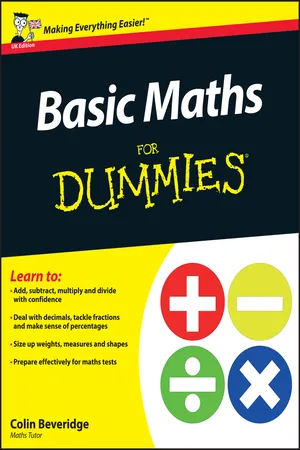Part I
Whole Numbers: The Building Blocks of Maths
In this part . . .
If you can count, you can do maths.
It’s helpful to build up shortcuts to make maths easier, though – and that’s what this part is all about: making maths easier. I show you how to stay calm and focused (and shut up the little voices telling you you can’t do maths) and then help you figure out how to add, take away, multiply and divide whole numbers – the sums all of the others are based on.
You need to be able to see if your answer looks right: to do that, you need to be able to round off and to estimate so that you don’t say something daft like ‘The Eiffel Tower is four centimetres tall’.
Chapter 1
Getting Started
In This Chapter
Realising you can already do maths Working with whole numbers Fathoming fractions, percentages and the like (with added pizza) Before you read any more of this book, take a big, deep breath. I know what taking on something difficult or frightening feels like – I feel just the same about dance classes, and I still have to steel myself a bit when I go into a supermarket.
I start this chapter by saying thanks – thanks for giving maths a try and thanks for listening to me. I’m not the kind of maths teacher who wears tweed jackets with leather patches and yells at you when you don’t pick up on his mumbles straight away. I want to help you get past the fear and the mind blanks and show you not just that you can do maths well, but that you already do maths well and can use that base to build upon. I show you how, with a bit of work, you can master the bits and pieces of maths you don’t have down to a tee. You’re smart. I believe in you.
Perhaps you find the maths you do in day-to-day life so easy you don’t even notice you’re doing sums. I spend some time in this chapter showing you what you already know and then introduce the topics I cover in the rest of the book.
You’re Already Good at Maths
Put your hand up if you’ve ever said something like ‘I’m no good at maths.’ I promise I won’t yell at you. Now imagine saying ‘I’m no good at talking’ or ‘I’m no good at walking.’ Those things may be true at times – I get tongue-tied once in a while, and I’ve been known to trip over invisible objects – but most of the time my mumbling and stumbling are perfectly adequate to get by. I bet the same thing applies with your maths. Maybe you freeze up when you see a fraction or just nod and smile politely when someone shows you a pie chart. This doesn’t mean you’re bad at maths, just that you trip up once in a while.
If you can shift your thoughts on maths from ‘I’m no good at this’ to ‘I’m still getting to grips with this’, you’ll create a self-fulfilling prophecy and begin to understand maths.
Part of the problem may be that you don’t realise how much of what you do every day involves doing maths in your head. You may not think you’re doing maths when you judge whether to cross the road on a red light, but your brain is really doing a series of complex calculations and asking questions such as:
How fast is that bus going, and how far away is it? How long will the bus take to get here? How wide is the road, and how long will it take for me to get across? What’s the probability of that driver slowing down to avoid me if I’m in the road? How badly do I want to avoid being honked at or run over? What are the survival and recovery rates for my local hospital? How soon do I need to be where I’m going? How much time will crossing now save over waiting for the light to change? You do all of these calculations – very roughly – in your head, without a calculator, and without freezing up and saying ‘I’m no good at maths.’ If you regularly got any of those sums wrong – the speed–distance–time analysis, the probability or the game theory – you’d be reading this in hospital and trying to figure out what the jagged line graph at the end of the bed means. (Turn to Chapter 16 if this really is the case – and get well soon!)
So before you cross the road on your way to work, you solve as many as six ‘impossible’ sums in your head, maybe before you’ve even had breakfast.
Your First Homework Assignment
I’m not a big one for setting homework, but I’m going to ask you to do one thing for me (and, more importantly, for yourself): if you ever find yourself in a situation where you feel like saying ‘I’m no good at maths’, catch yourself and say something else. Try ‘I used to struggle with maths, but I’m discovering that maths is easier than I thought’, or ‘I’m fine with day-to-day maths’, or ‘I really recommend Basic Maths For Dummies: this book turned me into a mathematical genius.’
Although mathematicians traditionally wear rubbish clothes, thick glasses and a bad comb...







